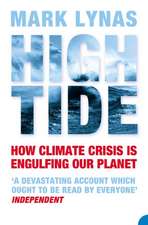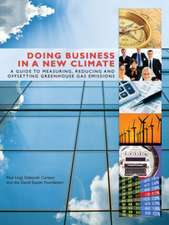Solving the Climate Crisis through Social Change: Public Investment in Social Prosperity to Cool a Fevered Planet: New Trends and Ideas in American Politics
Autor Gar W. Lipowen Limba Engleză Hardback – 11 mar 2012 – vârsta până la 17 ani
Preț: 358.85 lei
Preț vechi: 483.15 lei
-26% Nou
Puncte Express: 538
Preț estimativ în valută:
68.70€ • 70.69$ • 57.91£
68.70€ • 70.69$ • 57.91£
Carte tipărită la comandă
Livrare economică 01-15 martie
Preluare comenzi: 021 569.72.76
Specificații
ISBN-13: 9780313398193
ISBN-10: 0313398194
Pagini: 312
Dimensiuni: 156 x 235 x 25 mm
Greutate: 0.66 kg
Editura: Bloomsbury Publishing
Colecția Praeger
Seria New Trends and Ideas in American Politics
Locul publicării:New York, United States
ISBN-10: 0313398194
Pagini: 312
Dimensiuni: 156 x 235 x 25 mm
Greutate: 0.66 kg
Editura: Bloomsbury Publishing
Colecția Praeger
Seria New Trends and Ideas in American Politics
Locul publicării:New York, United States
Caracteristici
A full bibliographical reference list
Notă biografică
Gar W. Lipow is an activist and independent journalist.
Cuprins
Series ForewordAcknowledgments1 IntroductionPART I: SOLVING THE CLIMATE CRISISSection I: Sources of Waste2 Markets Inefficiently and Wastefully Address Costs Such as Energy, Emissions, and Water3 Nonmarket Social Failures Also Cause the Waste That Leads to Climate ChangeSection II: Solutions That Directly Tackle the Climate Crisis Will Increase Prosperity as a Side Effect4 Reducing and Compensating for Inequality and Atomization5 Public Investment Is One Direct Solution to the Climate Crisis6 Where Will the Money for Public Investment Come From?7 Public Investment Will Increase GDP and Prosperity8 Rule-Based Regulation9 Emission Pricing Can Reinforce Public Investment and Regulations as Solutions to the Climate Crisis10 Other Direct Policies: Surviving the Harm We Have Already Done, Climate Justice, and TradeSection III: Policies That Indirectly Lower Emissions as a Side Effect of Increasing Prosperity11 Social Consumption12 Leisure, GDP, and SustainabilitySection IV: Conclusion to Part I13 Politics: "If You Wanna Get to Heaven, You Got to Raise a Little Hell"PART II: EXTENDED DISCUSSION AND APPENDICESSection I: Extended Discussion14 Technological Solutions15 Nuclear Energy16 Measuring Military Spending17 Why the Deficit Is Not a ProblemSection II: Appendices18 Energy Demand Elasticity19 The Energy Efficiency Gap20 Accounting for Resource FlowsGlossaryReferencesIndex











